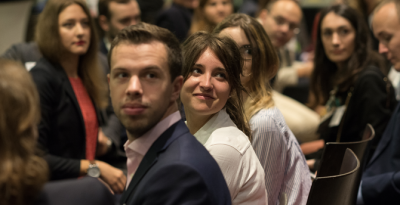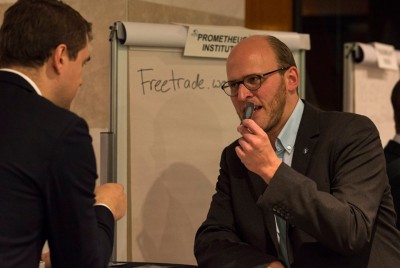We know what reforms are needed to increase the level of freedom, but we need to communicate them better. This is in my view one of the main conclusions of the Europe Liberty Forum 2017, held in Budapest in September this year. The conference, organized by the Atlas Network and the Hungarian Free Market Foundation, attracted over 130 participants from 34 countries, including representatives of many pro-liberty NGOs. The aim of the event was not only to deepen the knowledge and skills of the participants but also to build a network of contacts, meet new people in the freedom movement and refresh previous relationships.
Effective communication was the subject of various panels, but perhaps the most important were presentations by Daniel Anthony of Atlas Network (USA) and Glynn Brailsford of the Institute of Economic Affairs (UK). They showed how they have successfully improved the communication of their large and recognizable organizations and how to promote free market ideas even better.
Think tanks should focus not only on producing ideas but on the effective ways of communicating these ideas – to the media, decision-makers, local community leaders, and the general public. It is worth learning from the best – and this meeting, I hope, will lead to even better communication among many organizations and representatives of the freedom movement.
 The Forum was formally opened by Brad Lips, CEO of Atlas Network, who reminded the listeners that less state intervention means more opportunities to act for individuals. Later the floor was taken by Máté Hajba of the Free Market Foundation who sent an inspirational letter to the participants after the event. Then Zoltan Kész, whom we hosted this year in Poland at the conference “Institutional Systems and Quality of Life” organized to celebrate the occasion of the 70th birthday of Professor Leszek Balcerowicz, gave an important talk. Kész welcomed the guests in the “capital of populism,” which Budapest has become. He critically analyzed the policies of Victor Orbán, who restricts individual freedoms and political competition in Hungary, consolidating power around himself. In addition, the consolidation of power by Orbán leads to increasing corruption of people closely associated with the ruling party. Kész reminded us that the answer to collectivist populism should be a message that emphasizes freedom, but also responsibility and people taking matters into their own hands.
The Forum was formally opened by Brad Lips, CEO of Atlas Network, who reminded the listeners that less state intervention means more opportunities to act for individuals. Later the floor was taken by Máté Hajba of the Free Market Foundation who sent an inspirational letter to the participants after the event. Then Zoltan Kész, whom we hosted this year in Poland at the conference “Institutional Systems and Quality of Life” organized to celebrate the occasion of the 70th birthday of Professor Leszek Balcerowicz, gave an important talk. Kész welcomed the guests in the “capital of populism,” which Budapest has become. He critically analyzed the policies of Victor Orbán, who restricts individual freedoms and political competition in Hungary, consolidating power around himself. In addition, the consolidation of power by Orbán leads to increasing corruption of people closely associated with the ruling party. Kész reminded us that the answer to collectivist populism should be a message that emphasizes freedom, but also responsibility and people taking matters into their own hands.
Europe Liberty Forum is also a place to discuss threats to both freedom and security. Hence the panel on hybrid war and Russia’s aggressive policy under Putin. The debate was joined by the mayor of Vilnius Remigijus Šimašius (formerly associated with the Lithuanian Free Market Institue), Peter Krekó from the Hungarian Political Capital, and Pavel Schelin from Russia. Šimašius reminded us that there are different types of states, and not all of them are equally bad, although some libertarians seem to think so. Krekó argued that Russia is not as powerful as it pretends to be, and so we should not support this image of a strong Russia. The Russian authorities are powerful if governments are susceptible to their influence (e.g., various forms of corruption), like in Hungary. In turn, Schelin emphasized that Russian authorities need to create an image of a superpower, above all for the benefit of internal politics and domestic popularity of Putin.
The Forum would be incomplete without talks about the Austrian School of Economics. Mark Skousen, author of such books as “A Viennese Waltz Down Wall Street” or “Economic Logic,” described achievements and main figures of the School.
The first day of the Forum ended with a dinner, organized with a support of the Friedrich Naumann Foundation, and the keynote speech of Prof. Leszek Balcerowicz, the founder of the Civic Development Forum (FOR). Prof. Balcerowicz compared the effects of the existence of different institutional systems, and of good and bad transitions. Communication was frequently mentioned in his talk as an extremely important tool which can increase support for freedom and rule of law.
 Good communication is especially important when we want to communicate with the unconvinced. Therefore, the subject of the first panel of the second day was how to reach wider audience. Pavol Lupták talked about Paralelni Polis and explained how they reach people in the Czech Republic and beyond through cryptocurrencies and digital technologies. Christiana Stewart-Lockhart of the Institute of Economic Affairs delivered a very interesting presentation, describing how, by changing the language and using pop culture, one can reach more people, including many young ones. The IEA has organized lectures on the economics of “Game of Thrones” and their youth magazine “EA Magazine” reaches 25,000 students in economics. Matt Kibbe of Free the People (USA) explained how important is storytelling in promoting freedom and gaining new audiences. Examples of such stories by Matt can be found and watched on the website of his organization. Admir Čavalić from Bosnia and Herzegovina told of the Sarajevo Open Fest, which combines lectures, concerts, exhibitions and other forms of communication to attract even more people to the freedom movement and free market ideas.
Good communication is especially important when we want to communicate with the unconvinced. Therefore, the subject of the first panel of the second day was how to reach wider audience. Pavol Lupták talked about Paralelni Polis and explained how they reach people in the Czech Republic and beyond through cryptocurrencies and digital technologies. Christiana Stewart-Lockhart of the Institute of Economic Affairs delivered a very interesting presentation, describing how, by changing the language and using pop culture, one can reach more people, including many young ones. The IEA has organized lectures on the economics of “Game of Thrones” and their youth magazine “EA Magazine” reaches 25,000 students in economics. Matt Kibbe of Free the People (USA) explained how important is storytelling in promoting freedom and gaining new audiences. Examples of such stories by Matt can be found and watched on the website of his organization. Admir Čavalić from Bosnia and Herzegovina told of the Sarajevo Open Fest, which combines lectures, concerts, exhibitions and other forms of communication to attract even more people to the freedom movement and free market ideas.
The panel on the moral consequences of government regulations, led by Tom G. Palmer, was dedicated to seeking additional arguments for freedom. The discussion was joined by Vytautas Žukauskas and Žilvinas Šilėnas of the Lithuanian Free Market Institute. In recent months this Lithuanian organization has been researching the moral merits of classical liberal solutions and the moral consequences of illiberal policies. The important conclusions of their study are an essential complement to the arguments for liberty based on the efficiency and justice. A discussion on a similar topic, in which I participated as a panelist together with the guests from Lithuania and Professor Marek Góra, took place in Łódź in October during the “Freedom Games“.
Of course, these are only some of the discussions that took place during the Europe Liberty Forum. Everybody was able to find topics that match his interests or the needs of the organization with which he is associated. During the Forum the Europe Liberty Award was awarded to Maryan Zablotskyy of the Ukrainian Economic Freedoms Foundation for their work advancing land reform in Ukraine. The Europe Think Tank Shark Tank was won by Petar Čekerevac from the Serbian Libek organization for his idea of a “Lighthouse Outlet” project which is to become “an online media outlet bringing together the brightest libertarian minds of Serbia”.
The forum was not only a source of knowledge, skills, and contacts but also an inspiration for further work and commitment to defending and strengthening the level of economic freedom and other individual liberties in the European countries and beyond. These cyclical meetings also function as an excellent places to “recharge the battery” to continue efforts for freedom, responsibility, voluntary cooperation among individuals, the rule of law and justice. The next opportunity for such battery charging will be at Europe Liberty Forum 2018 in Copenhagen.



